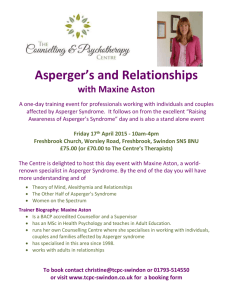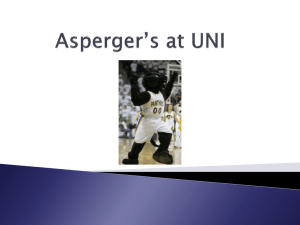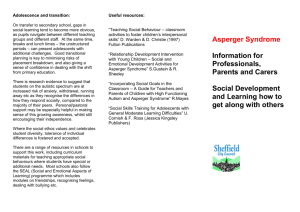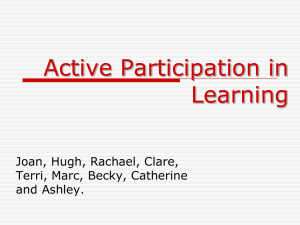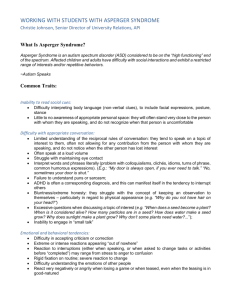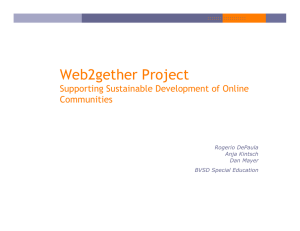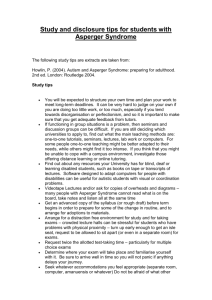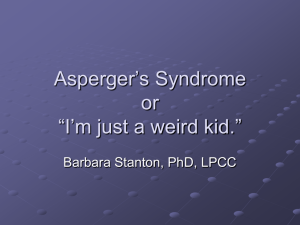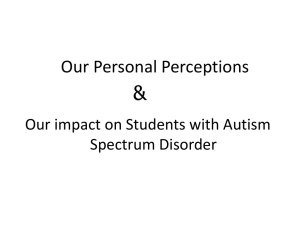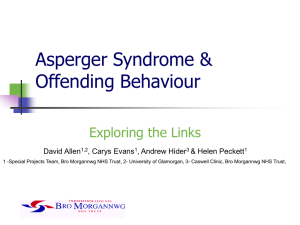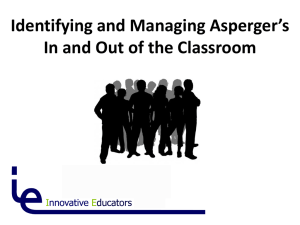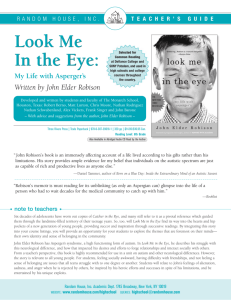Adult Mental Health Research Ideas NWCPP Dr Simon Gwyn
advertisement
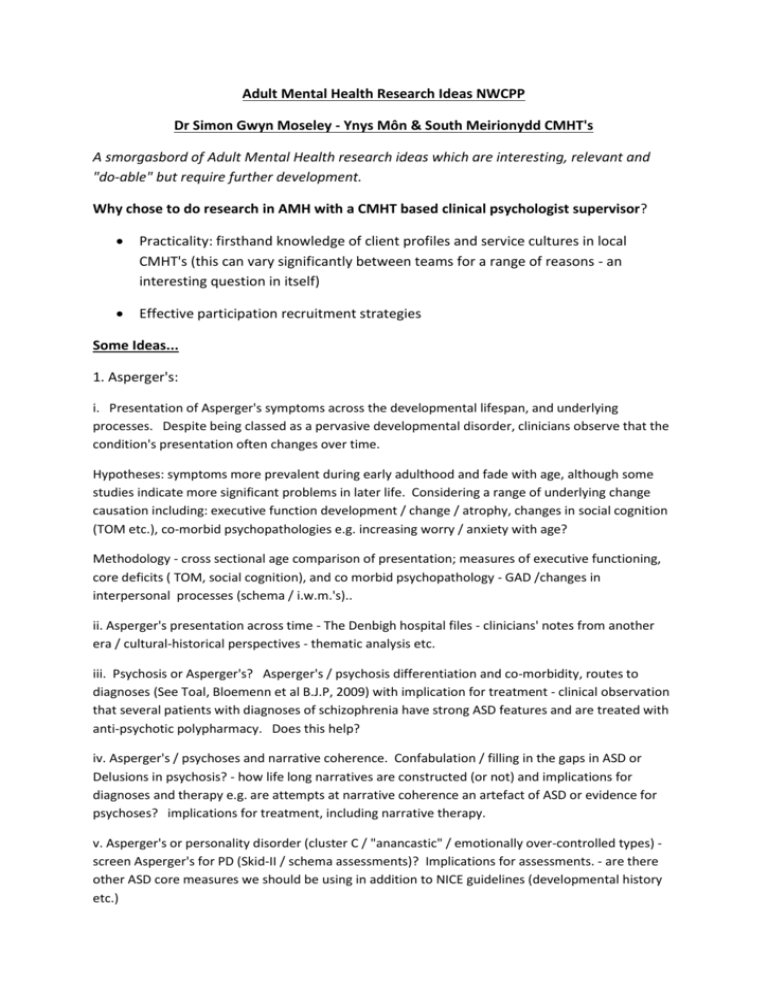
Adult Mental Health Research Ideas NWCPP Dr Simon Gwyn Moseley - Ynys Môn & South Meirionydd CMHT's A smorgasbord of Adult Mental Health research ideas which are interesting, relevant and "do-able" but require further development. Why chose to do research in AMH with a CMHT based clinical psychologist supervisor? Practicality: firsthand knowledge of client profiles and service cultures in local CMHT's (this can vary significantly between teams for a range of reasons - an interesting question in itself) Effective participation recruitment strategies Some Ideas... 1. Asperger's: i. Presentation of Asperger's symptoms across the developmental lifespan, and underlying processes. Despite being classed as a pervasive developmental disorder, clinicians observe that the condition's presentation often changes over time. Hypotheses: symptoms more prevalent during early adulthood and fade with age, although some studies indicate more significant problems in later life. Considering a range of underlying change causation including: executive function development / change / atrophy, changes in social cognition (TOM etc.), co-morbid psychopathologies e.g. increasing worry / anxiety with age? Methodology - cross sectional age comparison of presentation; measures of executive functioning, core deficits ( TOM, social cognition), and co morbid psychopathology - GAD /changes in interpersonal processes (schema / i.w.m.'s).. ii. Asperger's presentation across time - The Denbigh hospital files - clinicians' notes from another era / cultural-historical perspectives - thematic analysis etc. iii. Psychosis or Asperger's? Asperger's / psychosis differentiation and co-morbidity, routes to diagnoses (See Toal, Bloemenn et al B.J.P, 2009) with implication for treatment - clinical observation that several patients with diagnoses of schizophrenia have strong ASD features and are treated with anti-psychotic polypharmacy. Does this help? iv. Asperger's / psychoses and narrative coherence. Confabulation / filling in the gaps in ASD or Delusions in psychosis? - how life long narratives are constructed (or not) and implications for diagnoses and therapy e.g. are attempts at narrative coherence an artefact of ASD or evidence for psychoses? implications for treatment, including narrative therapy. v. Asperger's or personality disorder (cluster C / "anancastic" / emotionally over-controlled types) screen Asperger's for PD (Skid-II / schema assessments)? Implications for assessments. - are there other ASD core measures we should be using in addition to NICE guidelines (developmental history etc.) vi. Other Asperger's alternative / co-morbid conceptualisations - attachment insecurity / emotional reactivity. 3. Emotional dysregulation i. Trans-diagnostic investigation of emotional dysregulation themes (a common theme of mental health problems is difficulties coping with strong emotions, which can lead to cognitive and behavioural dysregulation including DSH, and avoidance strategies. ii. TED-D project (Transdiagnostic Emotional Dysregulation Device) - currently seeking funding. Biofeedback monitoring of autonomic arousal (GSR) with wearable technology (Activa-watch) linked phone app to investigate neurobiology of distress triggers in vivo (attachment crises / "failure" etc.). Phone app prompter to utilise distress tolerance skills, and monitor effects as a therapeutic aid / reduce time in acquiring distress tolerance skills. iii. Physiological solutions to DSH urges: TENS / Pavlov shock wristband (distress tolerance "sensation" solution - autonomic NS stimulation). (Recent study proposal gained approval for investigating acupuncture as a means of reducing DSH, given ethics passed on that study, this proposal could be less problematic!) 4. Some analogue investigations (general population studies with implications for AMH) i. Benign psychoses experiences - self evaluation and decision making regarding accessing services processes which differentiate benign from distressing in psychotic experiences. ii. Emotional dysregulation and dsh - how common are these in the general population compared to service users? Decision making regarding accessing services. iii. The effects of social media and personal technology on mood and well-being (mobile phone use / twittering / blogging) - contingency effects, frequency of social media use and "habit strength" EMPU: excessive mobile phone use; effects of impression management, social processing, anxiety and paranoia; some worldwide literature, but limited in UK. 6. Technology and the NHS. As well as previous examples above, use of Apps, IT and portable / wearable technology in NHS is very limited. Clinical Psychology application of technology lags availability and wide spread use in daily lives of patients. Examples include specific or tailored therapy apps to enhance 1:1 sessions - continual learning, digital video recording and use / rehearsal, emotional monitoring technology - GSR and digital facial emotion recognition (for patients and for the patient -therapist in-session processes - sig. recent papers and industry technology form US / advertising industry). 7. Organisational questions: i. Clinician perceptions of organisational priorities: process vs treatment. Attitudes / thematic analysis. ii. Responsibility and dependency creation - how responsible do clinicians perceive their clients to be? "How fragile is my client?" / "Consultation to the patient" and concepts of recovery & empowerment. How much is "done for" the patient - themes of client presentation, and clinician attitudes and behaviours and effects on outcomes. iii. Bilingual studies: perceptions and experiences of mental health problems from L1 Welsh bilinguals vs English lanugage only; attitudes to mental health and experiences of services. Is there a commonality or are there divergent themes? Thematic…validation and identity, and differences between presenting groups e.g. observation that PD more sensitive to identity issues?
